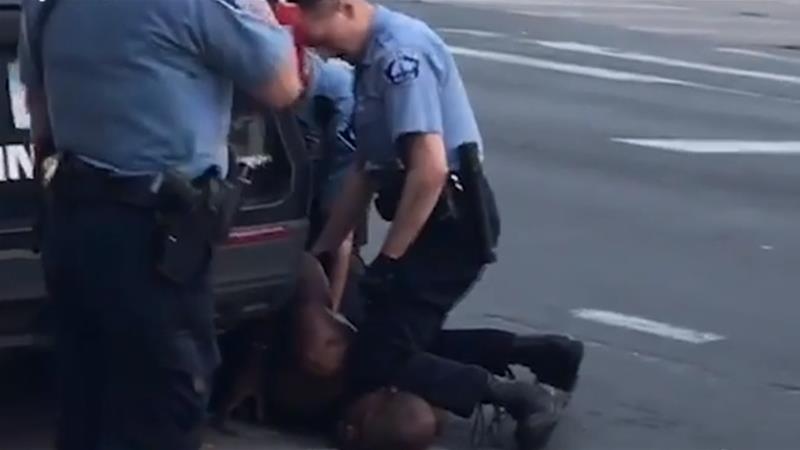At the crossroads of a global pandemic and unabated police brutality, Americans — and others across the world — are urging radical transformation for social justice in “the world’s greatest democracy.”
Washington, D.C. – Americans will without a doubt regard 2020 as one of the most ominous years in the United States’ recent history. The country is reeling from the disastrous economic, human, and psychological impact of the COVID-19 pandemic, while many Americans have realized that the US is not that powerful and resilient country the media machine and their politicians have touted for decades.
For reasons related to lack of preparedness, a deficient health system, lack of leadership in the White House, and partisan politics across the different branches of government, the most powerful country on earth has registered more than 105,000 deaths from COVID-19.
In the midst of mourning this hecatomb, the tragic murder of George Floyd at the hands of a police officer comes back to haunt Americans. The event is reminding them of the historic oppression of African Americans, throwing the whole country into chaos and sparking a level of uprisings not seen in the US since the civil rights movement in the 1960s.
For anybody familiar with US history and its politics, the occurrence of such revolts was not a matter of if, but of when. The monstrous murder of Floyd was just the spark that ignited the anger and frustration of African Americans and their allies, which has been brewing for decades.
A history of racially biased police brutality
Incidents where police callously murdered African Americans are legion in US history. In July 2014, New York police murdered African American Eric Gardner under similar circumstances to that of Floyd. A few weeks later, a police officer fatally shot Michael Brown in Ferguson, Missouri.
The sweeping protests that erupted across the country caused then-President Barack Obama to form the Task Force on 21st Century Policing to explore ways to improve trust between police and the public. The Trump administration has shelved the findings of the report, which were submitted in March 2015.
As a result, police brutality and racial profiling targeting the African American community and other minority groups have continued unabated. Since the beginning of the year, three major such cases against African Americans made headlines.
In February, a former police officer and his son chased and fatally shot Black man Ahmaud Arbery in Brunswick, Georgia. In March, police shot Breonna Taylor following a “no-knock” search warrant that targeted her boyfriend. And on May 25, the same day when Floyd was murdered, a New York woman called the police and claimed she was threatened by an African American man who asked her to leash her dog in Central Park.
These heinous acts that happened to be caught on camera are but the tip of the iceberg of a gloomy picture where African Americans are disproportionately targeted by police killings.
COVID-19 and racial unrest: Overlapping, intersectional crises
What makes matters worse for America is the timing of this revolt: It comes in the middle of an unprecedented economic crisis induced by the COVID-19 pandemic and a decisive electoral year that will decide the fate of the US for decades to come.
Perhaps the uprisings would not have been as violent had not the scourge of unemployment hit more than 40 million Americans in less than four months and had the COVID-19 pandemic not wreaked havoc among the African American community.
Out of this staggering number of people who lost their job and of the over 105,000 people who died because of COVID-19, African Americans are the most affected community. The events now unfolding reveal the festering deep wound of mistrust between African Americans, other minority groups, and the police.
The outcry expressed through these earth-shaking protests is not only about police brutality targeting minority groups in the US, but most importantly the failure of an entire political and economic system that has always been skewed against the underprivileged, leading to a widening gap between the rich and the poor.
Judicial prejudices of the ‘world’s greatest democracy’
Most Americans take pride in their country being the beacon of the “free world,” the land of opportunities, and the world’s champion of democracy and freedom of the press. No one can dismiss the merits of US democracy, the principles of checks and balances between different branches of government, and the primacy of accountability. But when contrasting the reality with slogans, one realizes that the US political and economic system has failed to offer underprivileged communities the opportunity to thrive.
What is the use of a democracy when this system, rather than offering people equality before the law, in terms of access to education, health care, and employment, entrenches the stranglehold of the privileged over the levers of power and prevents other communities from climbing the social ladder?
A society that is not guided by the principle of equal opportunity for all is doomed to be haunted by events such as those now rattling the country. Millions of American taxpayers, including African Americans and other minority groups, feel their country is leaving them behind and not protecting them against the vagaries of life.
For millions of Americans, state institutions such as the police and the justice systems—that are supposed to protect them and allow them to live in a secure environment—have turned into repression machines that inspire fear and resentment. The justice system does not treat all American citizens as equals. For decades, police brutality has gone unpunished and police have remained above the law, no matter how horrifying the crimes they commit against civilians. Countless cases such as Floyd’s were either covered up or the culprits were merely reassigned to another position or suspended.
Additionally, there is a two-track justice system: One for blue-collar workers and one for white-collar workers. The bias of the justice system against underprivileged people leads to its relentless assault against people who commit acts of theft, shoplifting, armed robbery, and drug use.
People of color convicted of petty crimes are often thrown in jail no matter the gravity of their misdemeanor. This is particularly true in the case of drug use. According to a recent study by the American Civil Liberties Union, “Black people are 3.6 times more likely than white people to be arrested for marijuana, despite similar usage rates.”
It is completely a different story when it comes to white-collar crimes, or crimes committed by privileged and well-connected white men and women. This type of crime can be of a great magnitude and involve hundreds of millions of dollars’ worth of taxpayers’ money. Yet perpetrators are more often treated with brazen leniency and receive shorter sentences than people of color convicted of arguably less damaging crimes.
A recent notorious example is that of Paul Manafort, President Trump’s former campaign chairman. Despite being convicted for a fraud scheme that cost the Internal Revenue Service (IRS) millions of dollars, he was sentenced to 47 months in prison.
As a result of this skewed justice system, African Americans are overrepresented in US prisons. While they represent only 13% of the US population, African Americans represent one-third of the country’s incarcerated population. White Americans represent 30% of the incarcerated population while they make up 60% of the overall population.
Entrench socio-economic disparities
In addition to the dysfunctional justice system, African Americans and other minority groups are also at the bottom of the ladder when it comes to healthcare coverage and income. African Americans and Hispanics are more likely to lose their health insurance in their adult years. Among the 27 million Americans who are uninsured, African Americans represent 9.7%, while white Americans represent 5.4%. Among the 87 million Americans who are underinsured, African Americans represent 18%.
Disparity between African Americans and whites also extends to education and income. African Americans still suffer from a disproportionate level of discrimination at every level of the education system.
Because of the high costs of university tuition, the American education system no longer affords upward social mobility to African Americans. Since the median wealth of African American families is disproportionately lower than that of white families ($17,409 versus $171,000), their offspring are in greater need to take student loans to pay for their education.
As they more often have no family members to help them repay their loans because Black families have such lower average incomes, and they face discrimination in the job market, African American graduates are the most affected by the student loan crisis and the ones who default most on their repayments. And the lucky ones who graduate college earn less than white Americans for the same job. In addition, a college education does not exonerate this community from being looked at with suspicion.
When it comes to income disparity and job security, African Americans are also at the bottom of the ladder. More than 20% of African Americans have an annual income of as little as $15,000. The median household income of African American families represents 61% of that of white households.
In addition, Black Americans were the most affected by the fallout of the 2008 Great Recession. When the general unemployment rate peaked at 10%, it affected 16% of African Americans and less than 9% of white Americans. They were also the hardest hit by the foreclosures crisis, causing them to lose $192 billion in wealth through 2012. This community is also at a disadvantage in the banking system, as its members are more than twice more likely to see their loan application turned down than white Americans.
Legislating the Black voice into silence
To top it all, a large portion of African Americans have been deprived of their constitutional right to vote because of the widespread practice of voter suppression. Many southern states have passed laws whose main aim is to disenfranchise African Americans and suppress their right to vote.
Because conservative lawmakers suspect most African Americans would vote Democrat in state or federal elections, many conservative states have resorted to a number of sophisticated schemes that allow them to take tens of thousands of African Americans off the voting lists.
For example, prior to Georgia’s governor’s election of November 2018, Brian Kemp, Republican nominee and at the same time Georgia’s secretary of state, blocked 53,000 from voting. 70% were African American. This practice of disenfranchising the Black community has prevailed for most of the US’ history. By 1906, more than 90% of African Americans in southern states were deprived of their right to vote.
Based on the foregoing, it is clear that the wounds affecting the African American community run deeper than most observers can imagine and require a holistic reform of the US political and economic system, as well as a serious and genuine debate on what model of society Americans want to pass on to their future generations.
The unrest unfolding in the US is a moment of reckoning for all components of its society. A democracy that does not ensure the equality of all before the justice system regardless of social status, ethnicity, or religion, that does not ensure equal opportunities in terms of economy, access to education, to health care, banking, etc., is no longer a democracy, but a fallacy, a farce.
This is exactly what has been happening in the US for decades, with politicians failing continuously to bridge the gap between the rosy pledges they make to their constituents during each election cycle and what they actually achieve for them.
Samir Bennis is the co-founder of Morocco World News. You can follow him on Twitter @SamirBennis.


